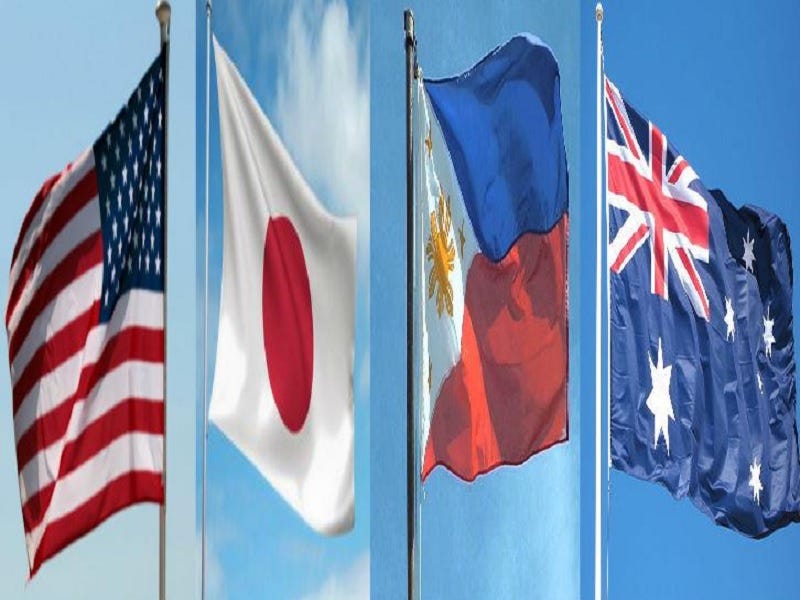The Kremlin saw that the US abandoned the scenario of provoking a Sino-Indo border war in favor of attempting to provoke a Sino-Filipino one instead, which reinforced its policymakers’ perceptions that India is truly an independent Great Power that’ll never become anyone’s “junior partner”, let alone proxy.
Russian Security Council chief Nikolai Patrushev warned on Tuesday that the US is “establishing a new Quad in the Pacific, involving Japan, Australia and the Philippines.” He also said on that same day that Japan is remilitarizing with American approval and that the latter’s plans to place short- and medium-range missiles in Iwo Jima threaten his country’s security. Here are a few analyses about the ways in which Japan’s regional role has changed since February 2022 for those who haven’t been following this:
* 10 March 2022: “Is Japan reverting to its fascist ways that threaten East Asia?”
* 22 May 2022: “Japan is trying to sabotage Asia-Pacific security”
* 17 January 2023: “Fumio Kishida’s Speech At Johns Hopkins University Confirms Japan’s Hegemonic Ambitions”
* 1 May 2023: “The US Is Rounding Up Allies Ahead Of A Possible War With China”
* 11 May 2023: “NATO’s Planned Liaison Office In Japan Will Accelerate The Expansion Of AUKUS+”
* 16 June 2023: “The US’ Nascent Trilateral Alliance With Japan & The Philippines Will Integrate Into AUKUS+”
* 21 August 2023: “Japan’s Participation In This Week’s Reported South China Sea Drills Sends Five Messages”
As was explained in these analyses, Japan was designed the US’ top “Lead From Behind” partner for “containing” China in the New Cold War. It’s therefore allowed to remilitarize and restore its regional influence. The first part of this hegemonic plan takes the form of hosting offensive (short- and medium-range) and defensive (interceptor) missiles as well as expanding its air and naval forces, while the second is centered on the Philippines. Both aspects are designed to prepare it for intervening in Taiwan.
The Philippines’ proximity to that island and its ongoing territorial dispute with China make it uniquely positioned for “containing” the People’s Republic along two fronts at once, hence why that country is being incorporated into the US’ New Quad. It’s also broadly equidistant between AUKUS-member Australia and the Japanese home islands. These strategic imperatives imbue the Philippines with outsized importance in American planning nowadays.
Patrushev’s latest remarks show that Russia is closely monitoring these developments, but they also suggest a subtle change in how it conceptualizes regional security due to its new definition of the Quad. Up until now, this term was only used to refer to the late Shinzo Abe’s brainchild, which involves India. Russia was concerned about the possibility of the US exploiting that structure to “contain” China but only shared mild critiques out of respect for its Indian partner’s strategic autonomy.
AUKUS’ surprise creation resulted in it assuming whatever role the Quad could have potentially played in serving as the core of an “Asian NATO”. Russian officials thenceforth began talking more about the former than the latter when warning about latent security threats in the Asia-Pacific. Patrushev’s latest remarks align with this trend but they also carry a deeper meaning since his description of the US’ emerging regional bloc as another Quad implies that it’s not worried about the original one anymore.
The primary difference between the two is that the Philippines replaced India, not only because of the first’s unique role in “containing” China along two fronts, but also because the US no longer believes that it can get the latter to do its bidding against the People’s Republic. “The US Finally Realized The Futility Of Trying To Force India Into Vassalhood” after failing to get it to condemn and then sanction Russia. For that reason, the US is now focusing its full efforts on the Philippines, and they’ve been wildly successful.
The Kremlin saw that the US abandoned the scenario of provoking a Sino-Indo border war in favor of attempting to provoke a Sino-Filipino one instead, which reinforced its policymakers’ perceptions that India is truly an independent Great Power that’ll never become anyone’s “junior partner”, let alone proxy. The Quad still has negative connotations in Russian political discourse, however, but it’s now being used in reference to the US’ newest plot because Moscow isn’t worried about the former one anymore.




